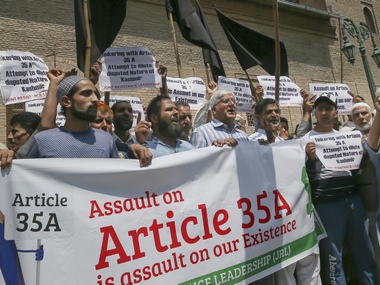With tensions rising in Jammu and Kashmir following the events of the past couple of days — large movement of military personnel into state, placing local leaders under house arrest, it is instructive to look at one of the major sources of concern in the northern-most state of India: Article 35A and its possible abrogation. **_Follow LIVE updates on the situation in Jammu and Kashmir here_** Here’s a look at what the Constitution says:
Saving of laws with respect to permanent residents and their rights. — Notwithstanding anything contained in this Constitution, no existing law in force in the State of Jammu and Kashmir, and no law hereafter enacted by the Legislature of the State:
(a) defining the classes of persons who are, or shall be, permanent residents of the State of Jammu and Kashmir; or
(b) conferring on such permanent residents any special rights and privileges or imposing upon other persons any restrictions as respects—
(i) employment under the State Government; (ii) acquisition of immovable property in the State; (iii) settlement in the State; or (iv) right to scholarships and such other forms of aid as the State Government may provide,
shall be void on the ground that it is inconsistent with or takes away or abridges any rights conferred on the other citizens of India by any provision of this part.
In summation, Article 35A gives the Jammu and Kashmir legislature full discretionary power to decide who the ‘permanent residents’ of the state are. It gives them special rights and privileges regarding employment with the state government, acquisition of property in the state, settling in the state, and the right to scholarships and other forms of aid that the state government provides. It also allows the state legislature to impose any restrictions upon persons other than the permanent residents regarding the above. To guarantee these special rights and privileges, the Article says no act of the state legislature that comes under it can be challenged for violating the Constitution or any other laws. Before Article 35A was introduced to the Constitution of India, the Governor and the Chief Minister of Jammu and Kashmir were addressed as the Sadr-e-Riyasat (President) and Wazir-e-Azam (Prime Minister).


)

)
)
)
)
)
)
)
)



